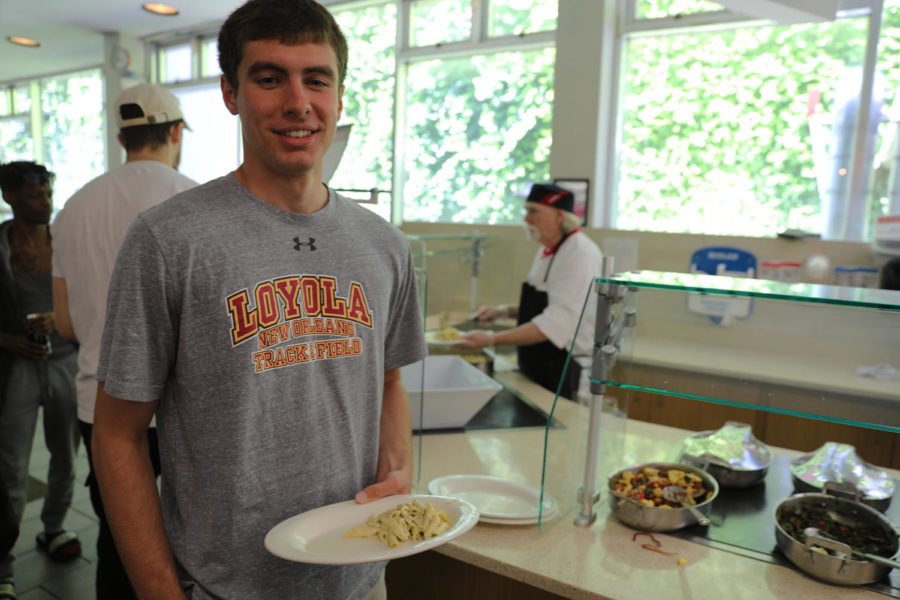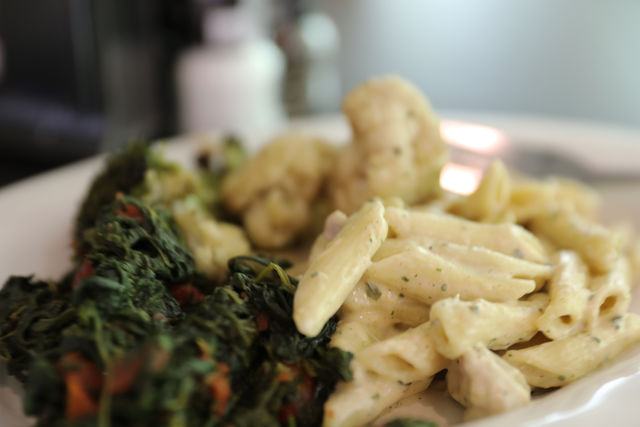Loyola athletes learn how to dine with the Wolf Pack
Environmental studies sophomore Liam Donovan picks up a plate of pasta in the Orleans Room. Wolf Pack athletes try their best to maintain a healthy diet.
April 9, 2019
Weight training, early-morning practices and post-game film breakdowns are all staples of the student-athlete experience, but an aspect of athleticism that often goes unrecognized is the attention to diets that many athletes and coaches strive for.
According to tennis Head Coach Kyle Russell, maintaining a nutritious diet for any student is a struggle, especially when the limited food options of a dining hall are combined with busy student schedules and the tendency of college students to eat less healthy foods.
This uphill battle only becomes harder for student-athletes who often hit the road for games or long tournaments and have limited dining options.
“We try and always find a Panera or something but a lot of places we go there’s not a lot of healthy alternatives and we have very little time to grab food,” Russell said. “We just went on a road trip and were looking for healthy, looking for healthy, but we ended up at an Applebee’s. I was watching what everyone was ordering and just threw my hands up in their air, like ‘what are you guys doing?’ So it’s definitely difficult.”
On the road, the tennis team tries to eat at places such as Zoe’s Kitchen and Newk’s Eatery but, when fast food is the only option, the team opts to chow down on burgers and fries after their competition.
For baseball player and business management senior Charlie Seiter cooks healthy meals at home at the beginning of the week and eats the leftovers for as long as they last in order to maintain his diet.
But, just as Russell expressed, finding food on the road is a different story.
“It’s difficult to eat well on the road. We’re usually pressed for time, so we have to grab quick meals, usually fast food. We’ll go to better places when possible, but that’s not very often,” Seiter said.
Maintaining a healthy diet not only helps Seiter build muscle, but it also helps him stay energized and focused on the field. But for some, especially students who don’t have coaches and teammates to help educate them on nutrition, defining what a healthy diet even is can be daunting.
“If an athlete takes the field without properly fueling their body, their performance will not be at its best,” Kelsey Rosenbaum, Loyola’s regional campus dietician, said. “Carbohydrates are the muscles main source of fuel, protein helps repair muscles, and fruits and veggies provide fiber, vitamins and minerals that work against inflammation.”
Psychology sophomore and swimmer Kamy Alexander spends her seasons avoiding the dessert table at the Orleans Room because it’s “bad news.”
“What kind of gas you put into your car affects how it runs, and it’s the same for your body. In order to perform at peak you have to eat right,” Alexander said.
But a healthy diet is not only made up of giant salads and grilled chicken. Russell also sees it as an education opportunity to bring teammates together.
“I think it’s really just important that they understand how athletes need to eat. Probably the best educators are their teammates,” Russell said. “What happens is the sophomores and juniors will talk with the freshman, tell them ‘you can’t eat that.’ And as they get older they deal with it better.”










